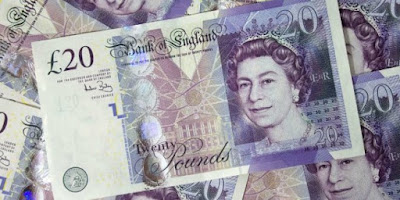Sterling dipped versus the dollar and euro on Wednesday, struggling for direction ahead of first quarter growth numbers due on Friday in a week so far dominated by events in the euro zone.
The pound sank to a two-week low versus the euro on Tuesday, as the single currency bounced for a second day following market-favoured centrist Emmanuel Macron’s victory in the first round of French presidential elections.
It stayed close to those levels on Wednesday, dipping 0.1 percent on the day to 85.16 pence per euro.
Against the dollar, sterling was 0.2 percent lower at $1.2819, around a cent off six-month highs hit last week when British Prime Minister Theresa May made a surprise announcement of an early general election in June.
Besides the gross domestic product numbers due on Friday, investors are on the lookout for fresh news surrounding Britain’s exit from the European Union.
That process largely seems to have been put on hold by the election, although May will meet with European Commission President Jean-Claude Juncker and the EU’s top Brexit negotiator, Michel Barnier, in London on Wednesday.
“The chief driver of sterling in the last few days and this week really has been the direction of the euro and the dollar,” said Alvin Tan, currency strategist at Societe Generale.
“There haven’t really been any major sterling-specific events in the last couple of days. So really sterling is kind of caught in between a stronger euro and a weaker dollar.”
The pound surged by as much as 4 cents on May’s announcement last week, but its failure to push on since points to the doubts that remain in the market about the outlook for the currency and the UK economy in the months ahead.
Deutsche Bank revised up its sterling forecasts last week and said that the election decision might be a “game-changer” for the pound, down 20 percent against the dollar since the Brexit vote last June.
But market bets against the pound are still close to record highs and were only trimmed slightly during last week’s moves.
Stephen Gallo at BMO Capital Markets said the spectre of Brexit negotiations would continue to weigh on the pound.
“Polls suggest the result will be a much bigger Conservative majority in the lower house, which would increase the likelihood of the UK reaching an internal political consensus on a Brexit strategy,” he wrote in a quarterly outlook.
“However, this doesn’t change the likelihood that the first phase of negotiations with the EU will be marked by sharp discord that is likely to be negative for the pound (and euro).” (Reuters)

No comments:
Post a Comment